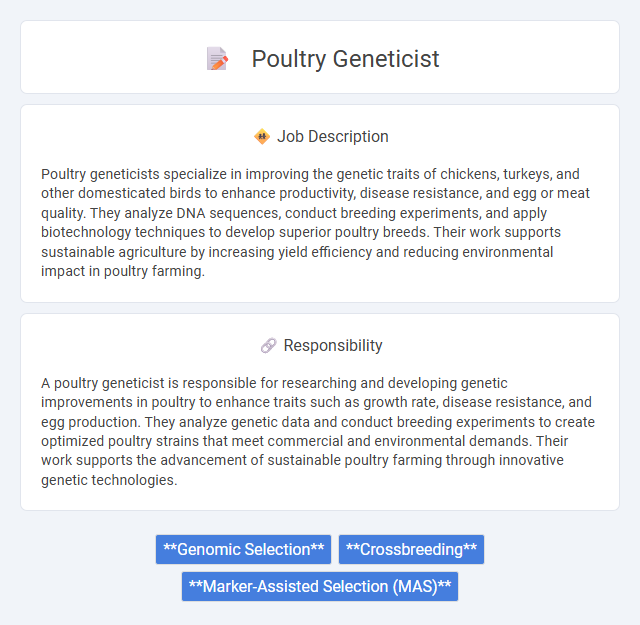
Poultry geneticists specialize in improving the genetic traits of chickens, turkeys, and other domesticated birds to enhance productivity, disease resistance, and egg or meat quality. They analyze DNA sequences, conduct breeding experiments, and apply biotechnology techniques to develop superior poultry breeds. Their work supports sustainable agriculture by increasing yield efficiency and reducing environmental impact in poultry farming.
Individuals with a strong background in genetics, biology, and animal science will likely be well-suited for a career as a poultry geneticist. Those who enjoy research, data analysis, and problem-solving may find this role engaging and fulfilling, as it often involves improving poultry breeds for productivity and disease resistance. However, candidates who prefer less technical or lab-based work might find the demands of this position challenging to meet effectively.
Qualification
A poultry geneticist typically requires a strong background in animal science, genetics, or biotechnology, often demonstrated by a bachelor's degree in these fields, though advanced positions frequently demand a master's or doctoral degree. Proficiency in molecular biology techniques, statistical analysis, and breeding program management is essential for developing genetically superior poultry strains. Experience with bioinformatics tools and knowledge of animal welfare regulations further enhance qualifications for this specialized role.
Responsibility
A poultry geneticist is responsible for researching and developing genetic improvements in poultry to enhance traits such as growth rate, disease resistance, and egg production. They analyze genetic data and conduct breeding experiments to create optimized poultry strains that meet commercial and environmental demands. Their work supports the advancement of sustainable poultry farming through innovative genetic technologies.
Benefit
A career as a poultry geneticist likely offers significant benefits such as contributing to the development of healthier, more productive poultry breeds, which may enhance food security and agricultural sustainability. Professionals in this field probably enjoy opportunities for research funding and collaboration with leading agricultural organizations. The job might also provide competitive salaries and the chance to work in cutting-edge biotechnology environments.
Challenge
Poultry geneticists likely face the challenge of balancing genetic improvements with animal welfare and environmental sustainability. They might encounter difficulties in managing complex genetic traits to enhance productivity without compromising disease resistance. Navigating regulatory frameworks and consumer expectations may also present ongoing obstacles in this specialized field.
Career Advancement
Poultry geneticists specializing in selective breeding and genomic technologies can advance to senior research roles within agricultural biotechnology firms or academic institutions. Expertise in CRISPR gene editing and bioinformatics enhances prospects for leadership positions managing breeding programs or developing disease-resistant poultry strains. Continuous skill development in data analysis and molecular genetics supports career growth toward roles in policy advising or global poultry production strategy.
Key Terms
Genomic Selection
Poultry geneticists specializing in genomic selection utilize advanced DNA marker technologies to identify and propagate desirable traits such as disease resistance, growth rate, and egg production in chicken populations. By leveraging high-throughput genotyping and bioinformatics tools, they enhance the accuracy and efficiency of breeding programs, accelerating genetic gains. This approach enables precise selection decisions, reducing generation intervals and improving overall flock performance in commercial poultry production.
Crossbreeding
Poultry geneticists specializing in crossbreeding develop optimized hybrid strains by combining desirable traits from different breeds to enhance productivity, disease resistance, and environmental adaptability. They analyze genetic markers and employ advanced selection techniques to maximize hybrid vigor and improve traits such as growth rate, egg production, and feed efficiency. This strategic breeding approach supports sustainable poultry production and meets industry demands for high-performance birds.
Marker-Assisted Selection (MAS)
Poultry geneticists specializing in Marker-Assisted Selection (MAS) leverage DNA markers to identify and select desirable traits such as disease resistance, growth rate, and egg production. This method accelerates breeding programs by enabling precise genetic improvements without waiting for phenotypic expression. Implementing MAS enhances poultry genetic gain efficiency, reducing breeding cycle time and increasing overall flock productivity.
 kuljobs.com
kuljobs.com